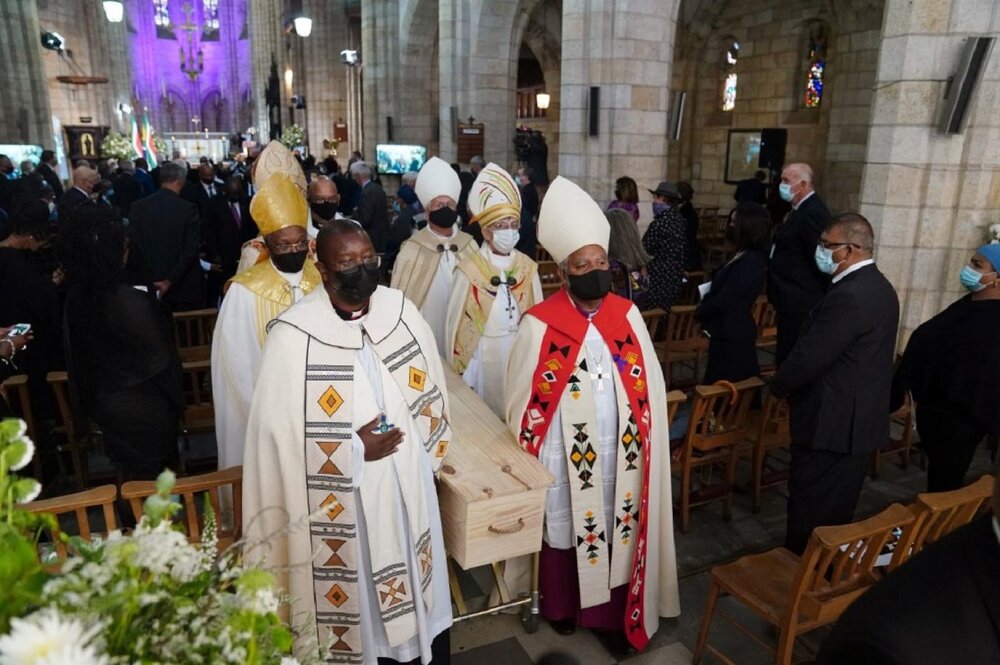Hawzah News Agency –The funeral of Archbishop Desmond Tutu, great hero of the struggle against the repressive, racist South African apartheid regime, took place on Saturday in Cape Town.
The Nobel Peace prize laureate died on Sunday, aged 90.
A contemporary of Nelson Mandela, Tutu was known not just for his role in ending a dark chapter of racial discrimination in his country but also for speaking out against injustices around the world, including in the Middle East, where he had been an outspoken critic of the Israeli occupation of Palestine and the siege on Gaza.
South Africa's President Cyril Ramaphosa lauded the late archbishop as "our moral compass and national conscience" as South Africa bade farewell at the New Year's Day state funeral.
"Our departed father was a crusader in the struggle for freedom, for justice, for equality and for peace, not just in South Africa, the country of his birth, but around the world," Ramaphosa said, delivering the main eulogy at the service in St George's Cathedral, Cape Town, where for years Tutu preached against racial injustice.
Tutu had been a passionate critic of the Israeli occupation of Palestine.
"I wish I could keep quiet about the plight of the Palestinians. I can't! The God who was there and showed that we should become free is the God described in the Scriptures as the same yesterday, today and forever," he told the Washington Post in 2013.
He drew parallels between Israeli occupation and apartheid in South Africa.
"What's being done to the Palestinians at checkpoints, for us, it's the kind of thing we experienced in South Africa."
Tutu was to lead a UN fact-finding mission with Professor Christine Chinkin to investigate a November 2006 Israeli attack on Gaza's Beit Hanoun district that led to the deaths of 19 Palestinians, including seven children.
Israel refused to grant Archbishop Tutu and Professor Chinkin authorisation to enter Gaza, but they were eventually able to travel to the besieged territory via Egypt. They met with survivors and eye-witnesses and produced a report to the Human Rights Council.
'The entire situation is abominable'
In a May 2008 statement about his mission, the archbishop decried the Israeli siege on Gaza, in place since 2007, as "a gross violation of human rights". He also said the Israeli siege contradicted the Jewish and Christian scriptures.
"Those scriptures speak about a God: a God of the Exodus, a God notoriously biased in favour of the weak, of the oppressed, of the suffering, of the orphan, of the widow, of the alien," he said.
"We are in a state of shock, exacerbated by what we subsequently heard from the victims and survivors of the Beit Hanoun massacre. For us, the entire situation is abominable," the joint statement by Desmond Tutu and Professor Chinkin said.
"We believe that ordinary Israeli citizens would not support this blockade, this siege if they knew what it meant for ordinary people like themselves. No, they would not support a policy which limits fuel supplies or automatically cuts off the electricity supply.
"They would not support a policy which jeopardizes the lives of ordinary men and women in hospital, that cuts off water and food from hospitals jeopardizing the lives of babies."
In August 2009, Desmond Tutu joined a delegation of the international NGO "The Elders" in a visit to Israel and occupied Palestinian territories to advocate for peace.
Most recently, in an article published in the Israeli newspaper Haaretz in 2014, Desmond Tutu declared his support for the international movement of boycott, sanctions and divestment as a peaceful means of opposing Israeli occupation.
"Those who continue to do business with Israel, who contribute to a sense of 'normalcy' in Israeli society, are doing the people of Israel and Palestine a disservice. They are contributing to the perpetuation of a profoundly unjust status quo," he wrote.


Your Comment